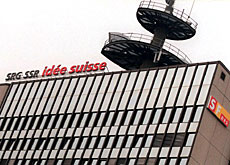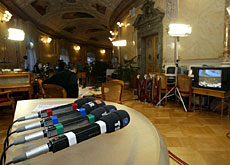Media law passes parliamentary hurdle

The House of Representatives has overwhelmingly approved legislation that could radically alter Switzerland’s media landscape.
The law brings many advantages for private broadcasters but also aims to protect public service television and radio.
After a marathon 19-hour debate, the House voted by 137 to 26 in favour of the new radio and television law.
The vote on the part of the bill covering advertising was closer – it was voted in by 99 to 69. Under the law alcohol advertising, as well as political and religious advertising, will be permitted for the first time on private radio and television stations in Switzerland.
But the Swiss Public Service broadcaster, the Swiss Broadcasting Corporation (SBC) – also the parent company of swissinfo/Swiss Radio International – remains exempt from this part of the legislation.
The law had faced opposition from the centre-right Radicals as well as the rightwing Swiss People’s Party. The Radicals had argued that the new law would curb competition.
But it was members of the People’s Party who mostly voted against the bill. They had maintained that it ran counter to liberal economic policy and would tighten rather than relax regulations, which would harm the SBC.
The law, which took four years to draw up in consultation with over 200 parties, still needs the approval of the Senate.
TV licence
The House also voted to exempt certain parties from paying the TV and radio licence. However, it decided – by 85 to 80 votes – that broadcasters, including the SBC, should not have to foot the bill for the exemptions.
Opponents of the move, including communications minister Moritz Leuenberger and members of the political Right, had argued that these exemptions would be too expensive.
Leuenberger said that the move would leave a deficit of almost SFr80 million ($63 million) in government funds, and added that it would be left to cantons and the government to pick up the tab.
The new legislation would also allow commercial broadcasters to claim more public funding – up to four per cent of licence fees. This means they stand to gain up to SFr44 million, which is four times more than they receive at present.
But the lion’s share of the fees would still be destined for the SBC.
Changing landscape
The broadcast bill is intended to reflect changes in the Swiss media landscape and take into account changing viewer habits.
Almost 90 per cent of Swiss are now hooked up to the cable network and have access to almost 50 different television channels. With the advent of digital technology this could rise to over 100 different stations.
The huge choice of international channels has led the country’s multilingual viewers away from domestic broadcasters to neighbouring television stations in France, Germany and Italy. This has hit the SBC, Switzerland’s main domestic broadcaster.
The current law makes it hard for private television stations in Switzerland to survive. In recent years, three private stations, Tele24, TV3 and RTL-PRO7, have all closed down.
Supporters of the new law had argued it was time for Switzerland to catch up with neighbouring countries, where deregulation took place in the 1980s.
However, analysts have warned that Switzerland – with a population of seven million – is too small to sustain numerous television channels.
The changes, if approved by the Senate, are not expected to come into force before the middle of 2005.
swissinfo with agencies
January 2000: Cabinet adopts a discussion paper on TV law and instructs the environment ministry to revise the law.
End 2000: The environment ministry publishes the draft law and starts the public consultation procedure.
Until April 2001: 200 parties including cantons, political parties and broadcasters take part in consultations.
February 2004: Draft law goes before parliament.
March 18 2004: House of Representatives approves bill; law to go to senate.

In compliance with the JTI standards
More: SWI swissinfo.ch certified by the Journalism Trust Initiative

You can find an overview of ongoing debates with our journalists here. Please join us!
If you want to start a conversation about a topic raised in this article or want to report factual errors, email us at english@swissinfo.ch.